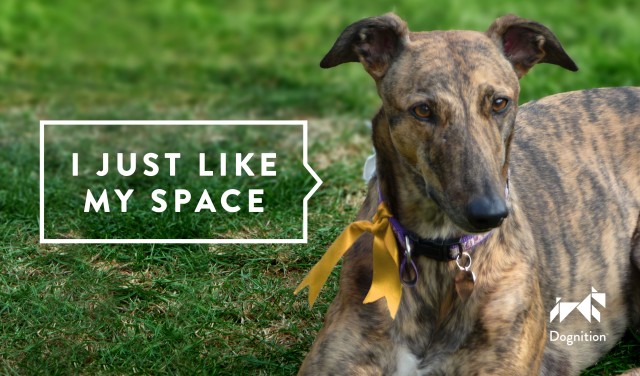
We’ve heard from some owners who have completed Dognition Assessment Toolkit with their dogs that they were initially a little surprised that their dog is a Socialite. When these owners think of the way their dog acts around strangers and new dogs, their Socialites seems anything but social. But once they read the in-depth description of our findings, the name Socialite begins to make sense.
Anti-Social yet Pro-Social
There’s a big difference between being uncomfortable in social situations and being non-social.
Anti-social measures how shy, or even aggressive a dog is, while social abilities measure how good they are at cooperating with their owners in a social way. For instance, in the Communication section in the Toolkit, a dog can be shy, or even aggressive, but awesome at reading human gestures. We’re measuring your dog’s social strategies rather than his or her social aversion.
So if you’ve got an anti-social Socialite, you’ve got a dog who didn’t let shyness or fear overcome his or her real genius. Instead, your dog has a remarkable set of social problem-solving strategies, which is something few other species have.
Aggression, Shyness, Anxiety, and Dognition
Right now, there is very little science about why some dogs get nervous or aggressive in strange situations. But Dognition is collecting data on anxiety, aggression and shyness that will add to the sparse science that exists on the topic. Our hope is that we’ll soon be able to shed light on the paradox of the “Anti-Social Socialite”.
The Yellow Dog Project
You’ve probably noticed that even anxious dogs are capable of warming up to new people and other dogs. And once they do, they show the same remarkable social skills that they use every day with the people they share their lives with.
But until your anxious dog has a chance to make new friends, how can you tell strangers that it’s not OK to come running to you with their dog? The Yellow Dog Project is the best solution we’ve seen for dogs who need a little space. Whether your dog is recovering from surgery, in training, or just not into socializing with strangers, tie a yellow ribbon around his or her leash. This will tell other people that your dog needs a little space.
One day, we hope to be able to make suggestion based in science, but until then, try a yellow ribbon. Your anti-social Socialite will thank you.
(photo by tomylees)



Robbie is definitely an anti-social socialite. Lived in isolation with a show breeder his first year—easy with any dog, but only comfortable with me. In the past 14 months, he has never once approached anyone for affection or even treats except for me. I don’t force, but he is exposed to people daily as we walk two miles in nearby parks. He is curious and now makes eye contact with humans, even turns to sniff as they pass by. Every week I see a slight improvement somewhere and I just know there is a charming, loving dog trapped inside his undeveloped brain screaming to get out. Robbie is a male Sheltie and maybe barks 2-3X a day. Rare, wouldn’t you say?
the Yellow Dog Project is fab, we have Space Dogs yellow ribbon campaign in the UK which also donates money to dog rescues via the charity attached to the campaign, if you want to know more take a look at http://www.spacedogs.org.uk